Daily Word of Grace for August 2020. Current postings of Daily Word of Grace can be found at the upper level of the page. Here is a link to see the current postings.
Daily Word of Grace #120: August 31, 2020 There is something with which every person on the planet struggles: fear. These fears come in wide variety—fear of heights (acrophobia), fear of enclosed spaces (claustrophobia), fear of flying (pteromerhanophobia—try to say that ten times fast), and of course, fear of clowns (coulrophobia—just ask Pennywise). One of the best Far Side cartoons (in my humble opinion) taught me about “Luposlipaphobia—“the fear of being chased by timber wolves around a kitchen table while wearing socks on a newly waxed floor.” On a more serious note, other common fears include fear of public speaking, fear of being found out, fear of failure, fear of the future, fear of being alone…on and on it goes. In these troubled times many people are fearful, and acting out in response with plenty of anger and its creepy cousin, anxiety. In scripture there are two antidotes for fear: God’s presence and God’s love. God promises to be with us no matter what, even when (especially when) we are afraid—as the Lord assured Joshua, “Do not be frightened or dismayed, for the Lord your God is with you wherever you go” (Joshua 1:9) and as Jesus assured his disciples, “Remember, I am with you always, to the end of the age” (Matthew 28:20). Moreover, God also promises to love us no matter what, with perfect love that literally “casts out fear” (1 John 4:18). Whatever your fear may be, may God’s presence and love reassure you. Love and Prayers, Dave

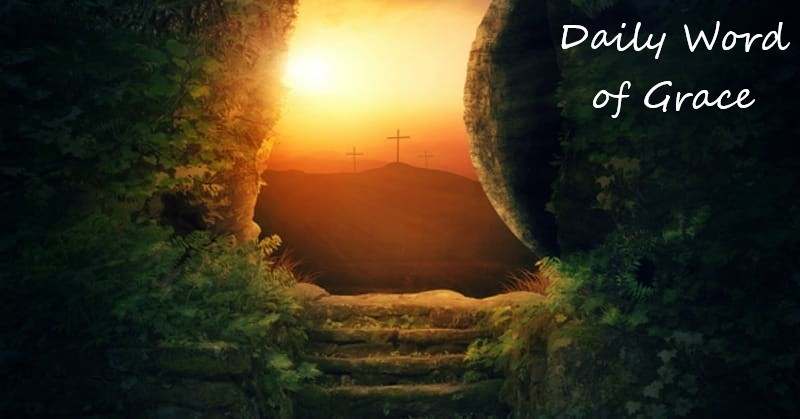
Daily Word of Grace # 119 (August 28, 2020) People appreciate it when you not only remember their name but also call them by their name. Dale Carnegie (1888-1955) famously put it this way, “A person’s name is to him or her the sweetest and most important sound in any language.” God knows your name, God remembers your name, and God calls you by your name. We see this in both the Old and New Testament. The great prophet Isaiah wrote, “I have called you by name, you are mine” (Isaiah 43:1). Throughout his earthly ministry Jesus called people by their name (Luke 10:41; Luke 19:5; John 1:42; etc.). When identifying himself as the Good Shepherd Jesus proclaimed, “He calls his own sheep by name and leads them out” (John 10:3). This is key aspect in the climactic miracle of the Gospel According to John: Jesus’ raising Lazarus from the grave. Jesus “cried in a loud voice, ‘Lazarus, come out!’” and when Jesus did so, Lazarus emerged from the tomb (John 11:43-44). Earlier Jesus had proclaimed, “Very truly, I tell you, the hour is coming, and is now here, when the dead will hear the voice of the Son of God, and those who hear will live” (John 5:25). The same God who has always known your name, remembered your name, and called you by your name, will once again call you by your name…and lead you out of the tomb. Love and Prayers, Dave
Daily Word of Grace # 118 (August 27, 2020) When it comes to the Great American Novel the shortlist of contenders always includes F. Scott Fitzgerald’s 1925 masterpiece The Great Gatsby. Among many other ways this novel is often viewed as a cautionary tale about the American Dream. The final sentence of The Great Gatsby is one of the most famous final sentences in literature: “So we beat on, boats against the current, borne back ceaselessly into the past.” During these trying times many of us definitely feel like “boats against the current.” The many crises in the United States this year have formed its own cautionary tale about the American Dream, and served as a stark reminder that in some ways we are indeed being “borne back ceaselessly into the past.” During one stormy night Jesus’ disciples found themselves in a terrifying gale at sea, not only beating “against the current” but also “battered by the waves…far from the land…the wind against them” (Matthew 14:24). And yet Jesus walked out to them on the water in the middle of the storm and assured them, “Take heart, it is I; do not be afraid”—and a few moments later Jesus stilled the storm (Matthew 14:25-27, 32). Jesus is with all of us in the midst of both personal and national storms to offer the same grace of God’s presence as he did with the disciples that night. While circumstances may leave us feeling “borne back ceaselessly into the past”, the good news of the gospel is that through God’s grace we are also being borne ceaselessly into the future by the One who will one day still every storm. Love and Prayers, Dave


Daily Word of Grace # 117 (August 26, 2020) In his 2016 book The Name of God is Mercy Pope Francis described God’s mercy this way: “Etymologically, ‘mercy’ derives from misericordis, which means opening one’s heart to wretchedness. And immediately we go to the Lord: mercy is the divine attitude which embraces, it is God’s giving himself to us, accepting us, and bowing to forgive…For this reason, we can say that mercy is God’s identity card. God of mercy, merciful God. For me, this really is the Lord’s identity” (8-9). This is very good news. What if God’s identity card was “God of wrath, wrathful God”, or “God of anger, angry God”, or “God of vengeance, vengeful God”? Thankfully, God is indeed the God of mercy…and it is this mercy of God upon which we are solely dependent. In his parable of the Pharisee and the Tax Collector Jesus contrasted a self-righteous Pharisee who bragged about both the bad things he never did and the good things he did, with a tax collector who simply prayed, “God, be merciful to me, a sinner!” Jesus emphasized that it was the tax collector who “went down to his home justified, rather than the other; for all who exalt themselves will be humbled, but all who humble themselves will be exalted” (Luke 18:9-14). Because God is indeed “God of mercy, merciful God”, what is true for the tax collector is true for you. Love and Prayers, Dave
Daily Word of Grace # 116 (August 25, 2020) Many people have tattoos. Often these tattoos have a story. While some tattoos may simply be the result of making a rash decision while inebriated, many have a deeper significance or a story behind them. It may be a tattoo symbolizing a significant event in one’s life, or a tattoo in memory of a loved one who has died. It may be a tattoo of a favorite band or a hero, a cherished place or a word of prayer. It may be a tattoo of a person deeply loved. There is a beautiful passage in the Old Testament book of Isaiah in which the great prophet wrote about God having a kind of tattoo, “I will not forget you. See, I have inscribed you on the palms of my hands” (Isaiah 49:15-16). In other words, you are so significant to God, so much on God’s mind and in God’s memory, so much one of God’s favorites, so deeply loved by God that you are inscribed on the palms of God’s hands. On Good Friday, Jesus’ loving hands were nailed to a cross out of love for you. When the Risen Jesus appeared to his disciples he did not hide his scars, but showed them to his disciples (John 20:24-29). And even now the scars of the Risen Jesus demonstrate that you have always been, and will always be, inscribed in the palms of God’s hands. Love and Prayers, Dave


Daily Word of Grace # 115 (August 24, 2020) Many years ago my family and I moved from Wyoming to South Carolina. Steph and our young children flew east and I drove all our possessions in a Ryder truck, towing our 1989 Honda Accord. As I drove east across Kansas on Interstate 70, I passed many vast fields of sunflowers. As you probably know, young sunflowers face the sun all day long, even on cloudy or rainy days. They face east at the rising sun, throughout the day turn in the direction of the sun all the way till facing west at sundown. During the night they shift east again in anticipation of the rising sun. This phenomenon is called heliotropism. Often older sunflowers stop turning toward the sun all day and instead simply face east, always in anticipation of the rising sun. In scripture we often read about the face of the Lord being turned towards us, shining on us—“the Lord make his face to shine upon you, and be gracious to you” (Numbers 6:25)—and again in the psalmist’s prayer, “Let your face shine, that we may be saved” (Psalm 80:3). In Jesus Christ the face of God shines on you even now (2 Corinthians 4:6) which means not only is the Lord gracious to you, but also that indeed you will be saved. No matter what is going on in your life, the Lord’s face continues to be turned toward you, continues to shine on you—even on cloudy or rainy days. Love and Prayers, Dave
Daily Word of Grace # 114 (August 21, 2020) In 1975 the classic rock band Pink Floyd recorded their gem Wish You Were Here at Abbey Road Studios in London (yes, the same Abbey Road featured on the iconic cover of the Beatles 1969 album). The title track of Wish You Were Here was co-written by Roger Waters and David Gilmour and in part a song of longing to be reunited with Syd Barrett, an original member of Pink Floyd who had succumbed to drug addiction. The chorus is something to which everyone can relate: “How I wish, how I wish you were here. We’re just two lost souls swimming in a fish bowl year after year. Running over the same old ground, what have we found? The same old fears. Wish you were here.” God’s love in Jesus Christ is good news for lost souls, good news “year after year” and forever, because God’s love in Jesus Christ is greater than all our fears, including “the same old fears” that seem to never quite go away. In fact, God’s love can cast out those fears (1 John 4:18)—and even when those same old fears reappear, God’s love can do the same…again and again and again. When it comes to our longing for the presence of God’s love in our lives, God has already answered our prayer, “Wish you were here”—for God is with us all the time, even this very moment, even “to the end of the age” (Matthew 28:20). Love and Prayers, Dave

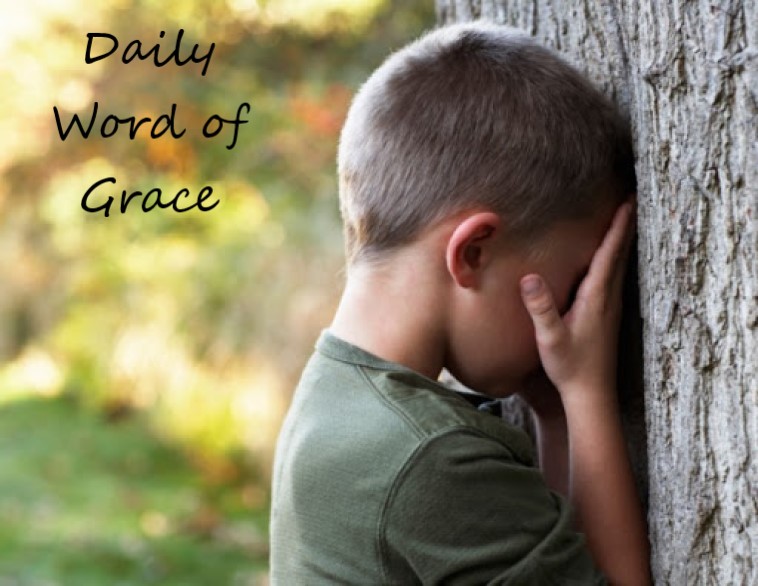
Daily Word of Grace # 113 (August 20, 2020) During my childhood summers the kids in our neighborhood loved to stay outside late to play Hide and Seek. Some were so good at hiding they never seemed to get caught. Others always hid in the same place and could not run fast to home base and so they were always an “easy catch.” Still others did not even have to hide because they were so fast and elusive that no matter who was “it” they could outmaneuver them and safely reach home base. Of course if you had a crush on the person who was “it” you did not try to hide and actually hoped you would get “caught.” Most of us play some form of hide and seek throughout our lives, and some are plagued with an incessant fear of getting caught. This goes all the way back to Adam and Eve in the Garden of Eden when after they ate of the forbidden fruit they tried in vain to hide from the Lord (Genesis 3:8). This has never stopped, for indeed “All we like sheep have gone astray; we have all turned to our own way” (Isaiah 53:6). And yet just as God sought Adam and Eve in the Garden of Eden, Jesus became incarnate in order to seek and save a lost world trying in vain to hide from God (Luke 19:10). On Good Friday Jesus refused to hide, but rather allowed himself to “get caught” and be “it.” And the good news of the gospel is that no matter how hard we try to hide, God keeps seeking until we are found and brought safely back to our eternal home base. Love and Prayers, Dave
Daily Word of Grace # 112 (August 19, 2020) One of Shakespeare’s often overlooked plays is Cymbeline, a play written late in the Bard’s career. King Cymbeline served as vassal king of ancient Britain for the Roman Empire during the first century. The play is filled with treachery, lechery and duplicity, and yet in the end it overflows with redemption and reconciliation. In the final scene King Cymbeline declares, “Pardon’s the word to all” ( V.v.423). How could King Cymbeline do that? Where is the justice? Where is the fairness? How do those involved in the treachery, lechery and duplicity throughout the play “learn their lesson”? And yet, King Cymbeline, who is in charge, declares pardon for everyone—and the result is redemption and restoration. In scripture Jesus Christ is identified as “the Lamb of God who takes away the sin of the world” (John 1:29), the One who died “for our sins in accordance with the scriptures” (1 Corinthians 15:3), who prayed from the cross, “Father, forgive them; for they do not know what they are doing” (Luke 23:34). Jesus Christ is not only the King of Kings but also the King of Mercy, whose love overflows with redemption and reconciliation, and who in his death and resurrection proclaimed to a world full of treachery, lechery and duplicity that yes, “pardon’s the word to all”—including you. Love and Prayers, Dave


Daily Word of Grace # 111 (August 18, 2020) Maya Angelou (1928-2014) was a poet, professor, civil rights activist, and devout Christian. One of her most famous quotes is this one, which she posted on her Facebook page in 2013: “Love recognizes no barriers. It jumps hurdles, leaps fences, penetrates walls to arrive at its destination full of hope.” There it is…the gospel. Even if other people see barriers to loving you, God’s love for you recognizes no barriers. Even if other people never try to clear any hurdles to love you, God’s love for you has already cleared every hurdle—including your sin, your doubt, your checkered past (or checkered present), or any other hurdle you may try to erect. Even if others will not leap fences to love you, God already has done just that in the incarnation, death, and resurrection of Jesus Christ. Even if there are walls between you and other people that none can seemingly penetrate, God’s love for you can—and does—for nothing separates you “from the love of God in Christ Jesus our Lord” (Romans 8:39). The ultimate proof of this love of God that “recognizes no barriers…jumps hurdles…leaps fences…penetrates walls” is found in the death of Jesus Christ on Good Friday: “God proves his love for us in that while we still were sinners Christ died for us” (Romans 5:8). And this amazing, unconditional, everlasting love of God will indeed carry you so that in God’s time you too will “arrive at its destination full of hope.” Love and Prayers, Dave
Daily Word of Grace # 110 (August 17, 2020) One of my favorite aspects of baseball is that there is no clock, and therefore no “clock management.” The game begins when the umpire declares, “Play ball” and ends when either a team scores the winning run or makes the final out. It is the action of the players that concludes the game, not running out the clock. Hall of Famer Mariano Rivera is the greatest relief pitcher in the history of Major League Baseball. He played 19 seasons for the New York Yankees, the last 17 as a relief pitcher, whose sole job was to make sure the final out(s) were made to seal a victory—and thus “save” the game. Rivera holds the record for most career games saved: an astounding 652 games, and played a vital role in the 5 World Series championships he won with the Yankees. When it comes to your salvation, it does not depend on a clock, but on the grace of God. Your salvation has been completed in the death and resurrection of Jesus Christ, who in his final moments on the cross declared, “It is finished” (John 19:30). Jesus Christ is the ultimate relief pitcher for the world, including you. When it comes to your salvation he has made the final out and saved not only the game, but your soul. Indeed, “by grace you have been saved through faith, and this is not your own doing; it is the gift of God” (Ephesians 2:8)—and when it comes to God’s grace, the clock never runs out. Love and Prayers, Dave

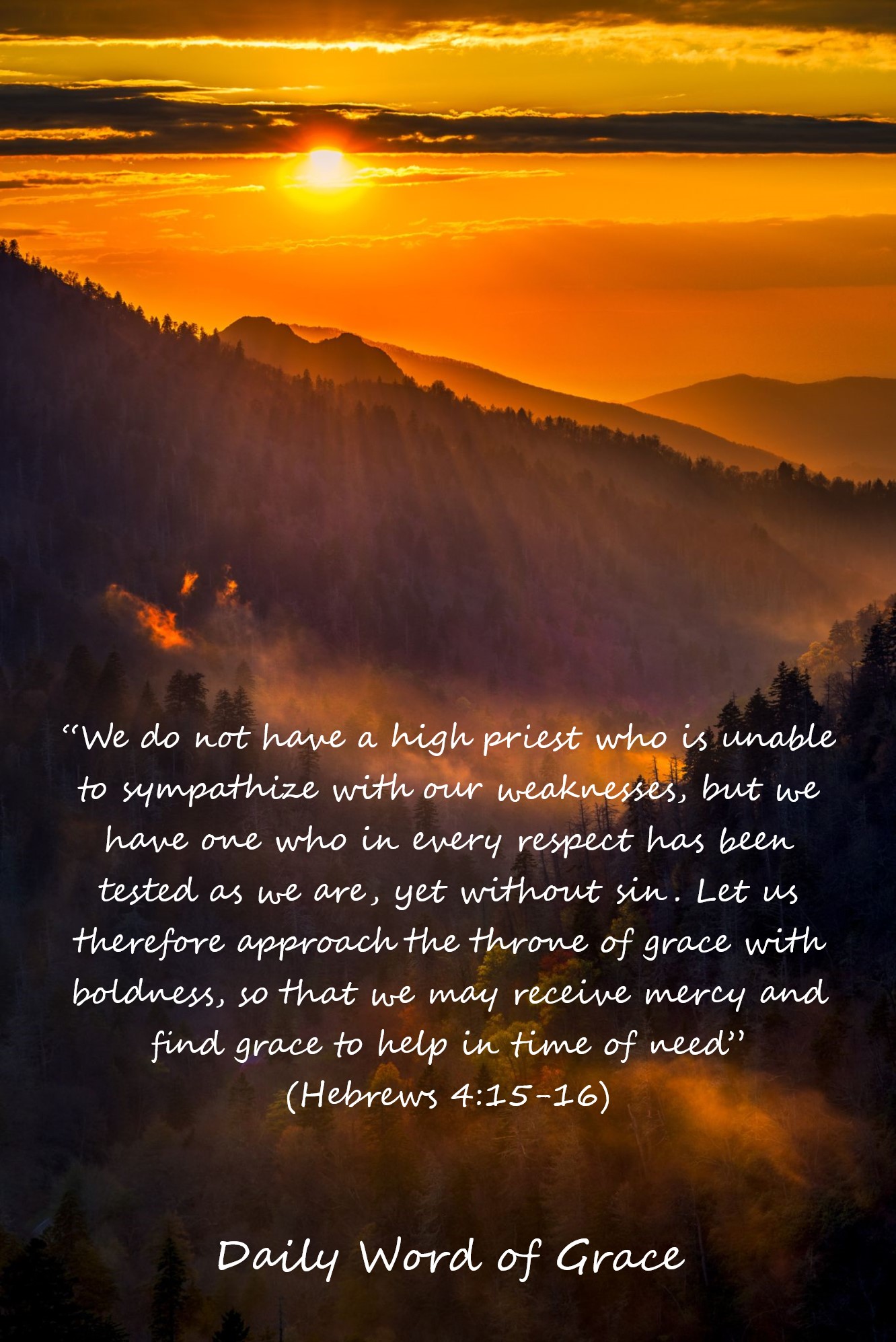
Daily Word of Grace # 109 (August 14, 2020) In his classic short story collection Dubliners James Joyce includes a series of stories that begin with childhood and adolescence, proceed through young adulthood and middle age, and end with old age and death. In the penultimate short story entitled “Grace” he recounts a sermon preached by Father Purdon. This sermon is more of a motivational speech for the congregation of mostly businessmen rather than a sermon about God’s grace for sinners, but Father Purdon still touches on the actual gospel: “Jesus Christ was not a hard taskmaster. He understood our little failings, understood the weakness of our poor fallen nature, understood the temptations of this life. We might have had, we all had from time to time, our temptations: we might have, we all had, our failings.” That is absolutely true, as we read in the Letter to the Hebrews, “We do not have a high priest who is unable to sympathize with our weaknesses, but we have one who in every respect has been tested as we are, yet without sin”—which means as the writer continues—“Let us therefore approach the throne of grace with boldness, so that we may receive mercy and find grace to help in time of need” (Hebrews 4:15-16). This mercy and grace of God remain available to us in every stage of our life, and yes, at our death too. The final word is a word of grace from the One who indeed understands us. Love and Prayers, Dave
Daily Word of Grace # 108 (August 13, 2020) Doubtless one of the greatest figures in the entire Bible is Moses, through whom God rescued the Israelites from four hundred years of bondage in Egypt. After the exodus Moses remained Israel’s leader in the wilderness for forty years. Near the end of his life Moses climbed to the top of Mount Nebo from where he glimpsed the promised land that although the Israelites would enter, he would not—as the Lord told him, “This is the land of which I swore to Abraham, to Isaac, and to Jacob, saying, ‘I will give it to your descendants’; I have let you see it with your eyes, but you shall not cross over there” (Deuteronomy 34:4). Shortly thereafter Moses died, and the writer of Deuteronomy eulogized Moses, “Never since has there arisen a prophet in Israel like Moses, whom the Lord knew face to face” (Deuteronomy 34:10). Moses prefigured Jesus Christ, who died on the cross and was raised from the dead in order to deliver the world from bondage to sin and death (Romans 6:5-10). The Lord who knew Moses “face to face” is the same Lord “who has shone in our hearts to give the light of the knowledge of the glory of God in the face of Jesus Christ” (2 Corinthians 4:6), and the same Lord whose grace ensures that we too will one day, like Moses, will see the Lord “face to face” (1 Corinthians 13:12). Love and Prayers, Dave


Daily Word of Grace # 107 (August 12, 2020) While we live in a throwaway culture, we do not worship a throwaway God—but rather a restoring, healing, forgiving God. In Japan there is a special type of art called kintsugi in which broken pottery, rather than being thrown away, is reassembled and repaired with traces of precious metals like gold and silver, creating a beautiful piece of art from something that had been broken. The only people without some kind of brokenness in their lives are liars, which means we all need the grace of God, we all need God’s art of kintsugi. In his Second Letter to the Corinthians the Apostle Paul vulnerably wrote about how God’s grace enabled gospel ministry in his broken life: “We have this treasure in clay jars, so that it may be made clear that this extraordinary power belongs to God and does not come from us. We are afflicted in every way, but not crushed; perplexed, but not driven to despair; persecuted, but not forsaken; struck down, but not destroyed; always carrying in the body the death of Jesus, so that the life of Jesus may also be visible in our bodies” (2 Corinthians 4:7-10). In the reassembly and repairing of the brokenness in our lives God uses something infinitely more valuable than gold and silver—Jesus’ precious blood shed on the cross (Colossians 1:19-20)—so that the brokenness in our lives is where we actually see the beautiful restoring grace of God even more clearly. Love and Prayers, Dave
Daily Word of Grace # 106 (August 11, 2020) As part of his ministry preaching the gospel and planting churches around the Roman world the Apostle Paul spent eighteen months in the prosperous and cosmopolitan city of Corinth. He later wrote the Corinthian church several letters, some of which are included in the New Testament. Near the beginning of his First Letter to the Corinthians he wrote of God’s faithfulness, “He will also strengthen you to the end, so that you may be blameless on the day of our Lord Jesus Christ. God is faithful; by him you were called into the fellowship of his Son, Jesus Christ our Lord” (1 Corinthians 1:8-9). We live in fickle world full of fickle people, which if we are honest, often includes our own fickle selves. And yet regardless of how fickle we may be, God has been, is now, and will always be faithful to us—as Paul later wrote to his protégé Timothy, “If we are faithless, he remains faithful—for he cannot deny himself” (2 Timothy 2:13). Even when everything may seem like it’s falling apart, even in the midst of suffering that we do not understand, God remains faithful, as the Old Testament prophet Jeremiah prayed in the wake of the destruction of Jerusalem, “great is your faithfulness” (Lamentations 3:23). Regardless of the fickleness you may encounter in your life, God’s faithfulness will see you through. Love and Prayers, Dave


Daily Word of Grace # 105 (August 10, 2020) When I was in college the supergroup Traveling Wilburys (Bob Dylan, George Harrison, Tom Petty, Roy Orbison, and Jeff Lynne…all in one band!) released their first hit, “Handle with Care.” This song is a plea from someone who has been through the mill to be handled with care, treated with grace: “Been beat up and battered ’round, been sent up and I’ve been shot down. You’re the best thing that I’ve ever found. Handle me with care…I’ve been fobbed off and I’ve been fooled, I’ve been robbed and ridiculed in daycare centers and night schools. Handle me with care.” Corporately, during what has so far certainly been one of the most stressful years in our history, this song really resonates. It also really resonates on an individual level for those who have “been beat up and battered ‘round” or “been robbed and ridiculed” in their personal lives. In Jesus Christ we have a Savior who always handles us with care, as we read in scripture, “When he saw the crowds, he had compassion for them, because they were harassed and helpless, like sheep without a shepherd” (Matthew 9:36). On Good Friday Jesus was literally “beat up and battered ‘round”, literally “robbed and ridiculed” for a world that did anything but handle him with care. And yet Jesus still handled everyone with care—and still does. This means when it comes to your Risen Savior, you can indeed “cast all your anxiety on him, because he cares for you” (1 Peter 5:7). Love and Prayers, Dave
Daily Word of Grace # 104 (August 7, 2020) There is a phrase used to describe someone who has messed up, really messed up, and as a result has “fallen from grace” or experienced a “fall from grace.” This means whatever favor or respect or prerogatives this person may have once enjoyed have all vanished and that person has become a persona non grata (a person without grace, a person not welcome). This phrase “fallen away from grace” is found in scripture, but in a way that is often misunderstood. The Apostle Paul warned, “You who want to be justified by the law have cut yourselves off from Christ; you have fallen away from grace” (Galatians 5:4). In other words, it is not those who have messed up, even really messed up, who have “fallen away from grace” but rather those who trust in themselves for their salvation, those who “want to be justified by the law” as opposed to being justified by the grace of God in Jesus Christ. In other words, you may “fall from grace’ when it comes to other people, but not with God, because on Good Friday Jesus took the fall in your place—on Good Friday Jesus became a persona non grata in your place. Jesus did this for the whole world, a world for which he prayed from the cross, “Father, forgive them; they do not know what they are doing” (Luke 23:34). It is that magnificent grace of God that saves us, for the gospel is eternally good news for every persona non grata. Love and Prayers, Dave

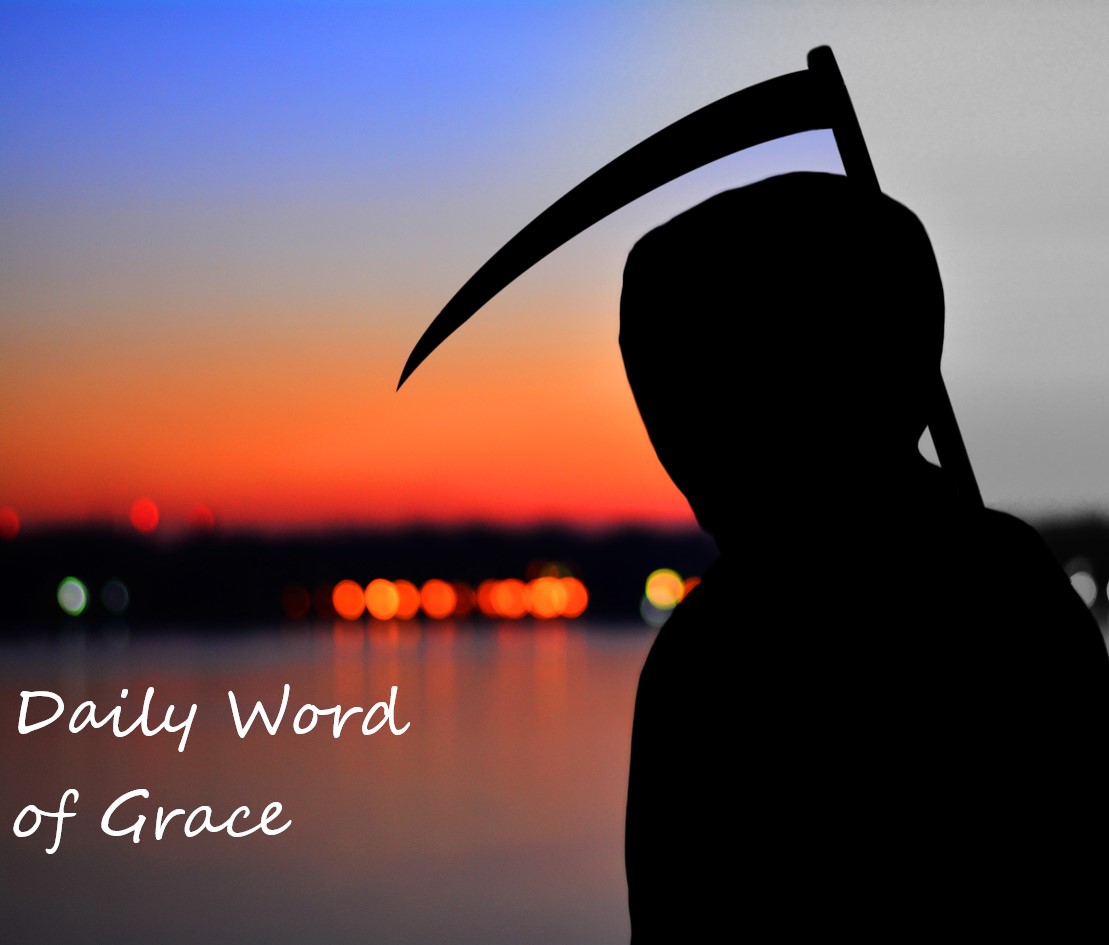
Daily Word of Grace # 103 (August 6, 2020) As a senior in high school English class I was introduced to John Donne (1572-1631), the Anglican priest and poet—specifically his “Holy Sonnet 10”—“ Death, be not proud, though some have called thee mighty and dreadful, for thou are not so; For those whom thou think’st thou dost overthrow die not, poor Death, nor yet canst thou kill me. From rest and sleep, which but thy pictures be. Much pleasure; then from thee much more must flow. And soonest our best men with thee do go, rest of their bones, and soul’s delivery. Thou art slave to fate, chance, kings, and desperate men, and dost with poison, war, and sickness dwell, and poppy or charms can make us sleep as well, and better than thy stroke; why swell’st thou then? One short sleep past, we wake eternally. And death shall be no more; Death, thou shalt die.” The Christian faith is centered not only on the death of Jesus Christ but also his resurrection. God’s love is stronger than death. We are assured in scripture that “as all die in Adam, so all will be made alive in Christ” (1 Corinthians 15:22) and that in heaven that same Jesus Christ will welcome us and wipe every tear from our eyes for indeed “death will be no more” (Revelation 21:4). The good news of the gospel is that when it comes to death, John Donne is exactly right: “Death, thou shalt die.” Love and Prayers, Dave
Daily Word of Grace # 102 (August 5, 2020) On his 1975 masterpiece album Blood on the Tracks is one of Bob Dylan’s best songs, “Shelter from the Storm”, comfort for those in need of just that: “I was burned out from exhaustion buried in the hail, poisoned in the bushes and blown out on the trail, hunted like a crocodile ravaged in the corn. Come in, she said, I’ll give you shelter from the storm.” Who among us cannot relate to that? Who among us has not had times when we too found ourselves “burned out from exhaustion” or “blown out on the trail”? In the penultimate verse Dylan continues, “In a little hilltop village they gambled for my clothes. I bargained for salvation and they gave me a lethal dose. I offered up my innocence and got repaid with scorn. Come in, she said, I’ll give you shelter from the storm.” That is a reference to Good Friday. As Jesus suffered “on a little hilltop” called Calvary soldiers indeed gambled for his clothes (Matthew 27:35), and on the cross Jesus “offered up (his) innocence and got repaid with scorn” (Matthew 27:39-44). Jesus did all this to bargain for your salvation. And even now the Risen Jesus remains your “shelter of the Most High” (Psalm 91:1), your “shelter from the storm.” Love and Prayers, Dave
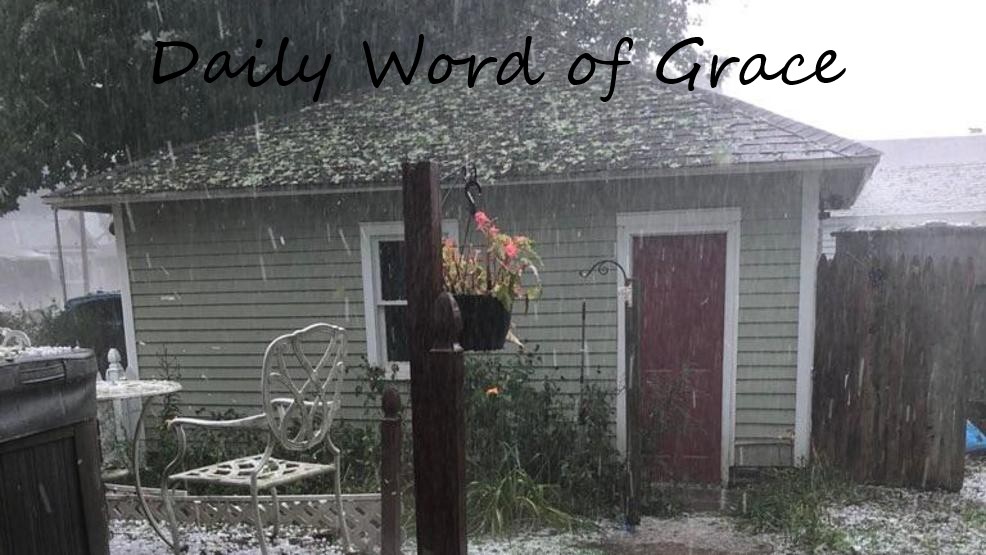
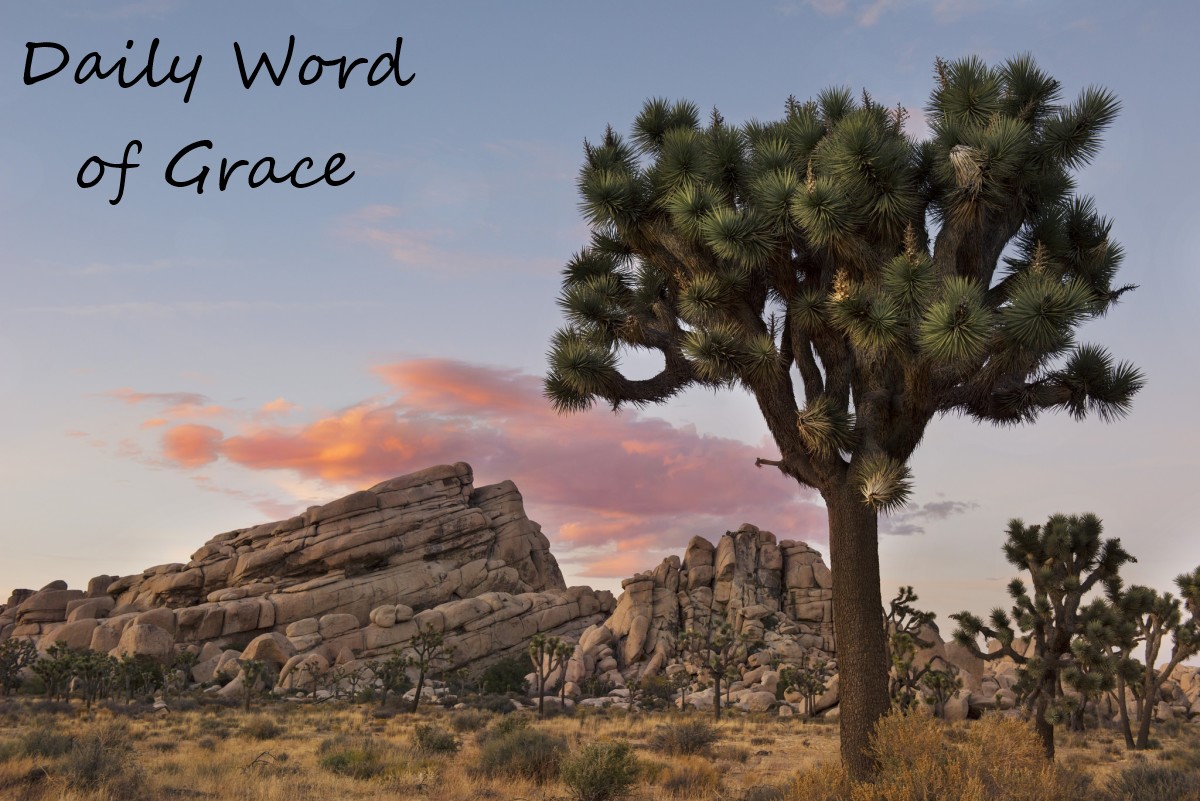
Daily Word of Grace # 101 (August 4, 2020) On a crisp late autumn Sunday is November several years ago I spent one of the best days of my life at Joshua Tree National Park in California. I entered at the north entrance of the park in the higher elevated Mojave Desert, and slowly worked my way south all the way to the southern entrance in the lower elevated Colorado Desert. This included a long solitary hike that ended on a mountain peak from which you could watch the vast shadows of the clouds traverse the even vaster desert. Of course, during that hike I listened to U2’s epic 1987 album, The Joshua Tree, on my iPod. The so-called Joshua Trees, Yucca brevifolia (you won’t be quizzed on that) only thrive at certain higher elevations. As you drive south through Joshua Tree National Park you see many Joshua Trees in the Mojave Desert, but as you descend toward the lower elevation Colorado Desert, you see fewer and fewer, until finally you do not see any at all. Thankfully, God’s grace is not limited to any elevation in your life, but transcends every high point, every low point, every desert in your life. Moreover, there is a different kind of Joshua Tree, the cross, where Jesus (whose Hebrew name is Joshua, meaning “Yahweh saves”) died as “the Lamb of God who takes away the sin of the world” (John 1:29) to cover you and your life with grace, regardless of what elevation or desert you find yourself. Love and Prayers, Dave
Daily Word of Grace # 100 (August 3, 2020) One of my all-time favorite Saturday Night Live skits is “More Cowbell”, which was a parody of an episode of the VH1 television series Behind the Music, specifically about Blue Oyster Cult’s 1976 hit “(Don’t Fear) The Reaper.” In the sketch the band is in the studio recording and Gene (Will Ferrell) is fiercely playing the cowbell, so much so that the rest of the band can’t stay focused and the recording session begins to break down. But to the band’s surprise, famous record producer Bruce Dickinson (Christopher Walken) has the opposite response: “It was sounding great, but I could’ve used a little more cowbell.” After a couple more failed takes the band begins to fall apart, and yet even so Bruce Dickinson still insists, “I gotta have more cowbell….Guess what? I got a fever, and the only prescription is more cowbell!” One of the many reasons this skit is so hilarious is because the one thing destroying the song, Gene’s ridiculous cowbell playing, is still the one thing about which the record producer insists. In our own lives we do the same thing. Each of us in our own way insists on metaphorically playing some kind of cowbell, persisting in some kind of destructive behavior when it is the very thing wreaking havoc in our lives. The only prescription for this is not more cowbell, but more grace—and thankfully God gives us exactly that in Jesus Christ (John 1:16). Love and Prayers, Dave
